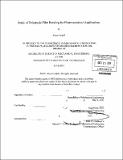Study of polymeric film bonding for pharmaceutical applications
Author(s)
Cardell, Alyse (Alyse Christine)
DownloadFull printable version (4.645Mb)
Other Contributors
Massachusetts Institute of Technology. Dept. of Mechanical Engineering.
Advisor
Jung-Hoon Chun.
Terms of use
Metadata
Show full item recordAbstract
Currently employed batch manufacturing processes for tablet-making in the pharmaceutical industry are estimated to cause the loss of as much as 25% of revenues due to batch rejection, rework and investigations. An alternate approach is being developed at the MIT-Novartis Center for Continuous Manufacturing (MITCCM) and is designed to be useful in accelerating the introduction of new drugs in the market, minimizing waste, reducing energy and raw material usage, carrying out quality checks online as opposed to post-production, and increasing the overall reliability and flexibility of the production process. To this end, we carry out a simple three step process to manufacture tablets - solution-making, casting, and compaction - to transform polymer based thin-films into tablets. By utilizing the interdiffusion model of polymer adhesion from past studies, we combine the base polymer HPMC (hydropropyl methyl cellulose) with varying amounts of a popularly used plasticizer PEG (polyethylene glycol) in order to achieve adequate bonding for thin-films. The effects of plasticizer in aiding polymer adhesion through interdiffusion are investigated by evaluating the glass transition temperatures and stress-strain characteristics. Finally, thin-film formulation, based on 9% PEG concentration, is employed for tablet-making and the effect of compaction pressure and dwell time on strength of thin-film-tablets is investigated. It is found that appropriate compaction pressure is necessary to allow bonding through interdiffusion without material failure, and larger dwell times favor strong bonding. The procedure proposed in this thesis can be applied to any polymer/plasticizer mix. Furthermore, this method illustrates the applicability of thin-films as a potential candidate for tablet making, as compared to the current powder-compaction technology.
Description
Thesis (S.B.)--Massachusetts Institute of Technology, Dept. of Mechanical Engineering, 2011. Cataloged from PDF version of thesis. Includes bibliographical references (p. 29).
Date issued
2011Department
Massachusetts Institute of Technology. Department of Mechanical EngineeringPublisher
Massachusetts Institute of Technology
Keywords
Mechanical Engineering.